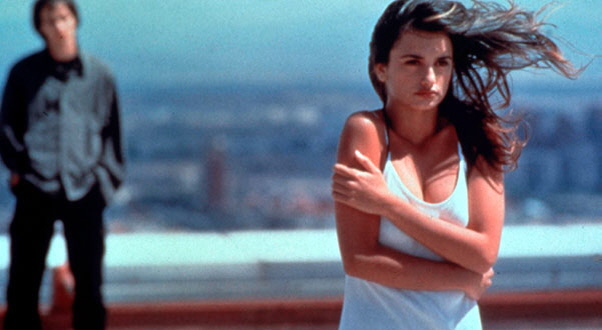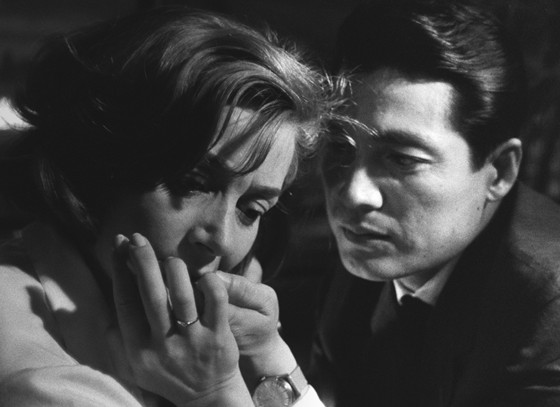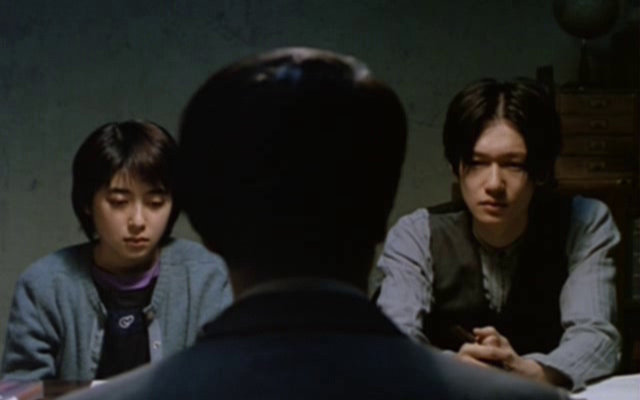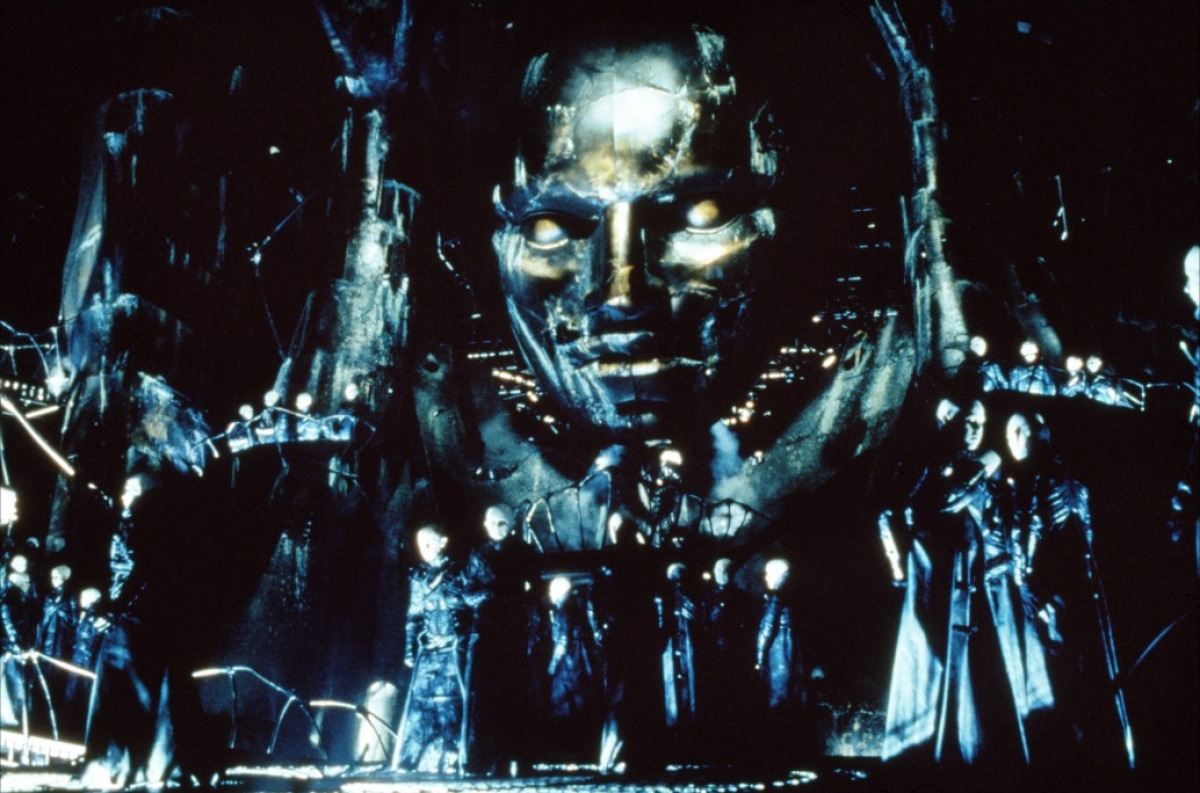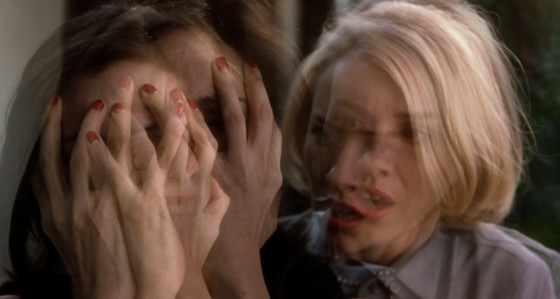5. Open Your Eyes (Alejandro Amenábar, 1997)
A twisty, mind-boggling fever dream of a film, Open Your Eyes is perhaps best known in its American remake form as Vanilla Sky. Whilst Cameron Crowe’s re-tread is faithful and well-executed, taking in Alejandro Amenábar’s original Spanish version is truly the best way to experience this thrilling, imaginative and intelligent screenplay.
Eduardo Noriega stars in the lead role as Cesar; a handsome, successful man dripping in confidence who has women falling over one another to do so much as shake his hand. After one bitter, jilted ex intentionally tries to kill both herself and Cesar by crashing her car, the stud’s flawless appearance becomes hideously disfigured, with doctor’s telling him that the damage is irreversible.
Unable to cope with his unfamiliarly flawed features, Cesar bathes himself in alcohol one night and wakes up to a whole new world, where nothing is quite as it was before and nobody appears to be who they seem. Curiously vague and captivatingly strange, Open Your Eyes intersperses snippets of reality with dream for its duration, allowing for a breath-taking, mind-bending watch that ranks it among the best psychological thrillers of recent times.
4. Hiroshima Mon Amour (Alain Resnais, 1959)
A movie that held a pivotal role in propelling forward the momentum of the French New Wave film movement, Hiroshima Mon Amour remains one of Alain Resnais’ finest directorial efforts in a career that spanned an incredible six decades.
Considered by many to be one of the defining films of the 1950’s, there’s little doubting Hiroshima Mon Amour’s greatness as a movie, although to call it mildly challenging may be somewhat of an understatement.
Essentially a long conversation between two people – a French actress (Emmanuelle Riva) and a Japanese architect (Eiji Okada) – about the bombing of Hiroshima, Resnais’ project mainly depicts Riva’s version of events as she sees them; Okada occasionally chiming in with his own two cents’ worth to either protest or bring her observations into disrepute.
Hiroshima Mon Amour explores the aspect of recalling a horrific event with admirable aplomb; both characters evidently uneasy as they compare the disturbing images and emotions associated with this dark day in history with simple humanist issues such as basic intimacy and relationships.
Hiroshima Mon Amour is ponderous, demanding and ultimately hugely rewarding viewing, and remains one of the most integral pieces of cinema concerning the aspect of memory ever released.
3. After Life (Hirozaku Koreeda, 1998)
If you could take one memory from your own life, and live within it for eternity, which memory would you choose? This is the question that Japanese director Hirozaku Koreeda asks us with After Life – a tentatively challenging movie about taking treasured memories from one existence across into the next.
The movie is set in a waystation, where people who arrive are calmly told that they have recently passed away, and now must choose a memory from their human lives to re-experience forever in the afterlife. The staff at the waystation are then tasked with staging and filming this moment for the individual to take with them into the next phase of existence.
Many of the finest movies ever made are the ones that make viewers reflect on themselves as a person, and ask themselves what they’d do if they were in a particular character’s shoes. After Life does this in the best possible way; provoking viewers to dig around in the deepest recesses of their minds to pull out their own happiest, most cherished recollections and relive them. It might even encourage some to go out and forge new, happy memories. Any film that does that deserves to be seen.
2. Dark City (Alex Proyas, 1998)
Few films have achieved the great feat of Dark City; which is to create a movie cloaked by nightfall for its duration and remain stimulating. The obscure, gloomy nature of dusk can make pictures set against this backdrop appear bleak and lifeless, but Alex Proyas puts a stylish, imaginative spin on a pitch-black piece to create a mysterious, intelligent and absorbing neo-noir thriller.
Rufus Sewell wears a panic-stricken expression as John Murdoch – a man who wakes up confused in disoriented in a grimy hotel bathtub with no idea who he is or what he is doing there.
After receiving a warning call that he is sought after by some dangerous people who are due to arrive imminently, Murdoch promptly leaves the scene, noticing the corpse of a woman as he does so. Murdoch races through a city engulfed in perpetual darkness in an attempt to brighten his blank mind, his eyes darting around in a search for some clue – any clue – of who he might be.
Dark City reveals exciting new layers as it rapidly unravels, moving from noir mystery and suspense into more complex questions regarding how alien species might handle the human mind and the aspect of human memory. Featuring some terrific performances by Sewell, Kiefer Sutherland, Jennifer Connolly and William Hurt, Dark City is a memory movie worth seeing at all costs.
1. Mulholland Drive (David Lynch, 2001)
Is any of Mulholland Drive real, or is all of it a dream that takes place inside a jilted ex’s mind?
Debates still rage on about David Lynch’s neo-noir masterpiece from 2001; perhaps the only film ever made that becomes more mesmerising as it makes less sense. Naomi Watts stars as a fresh-faced actress who arrives in Hollywood with a thirst for the spotlight.
After entering her brand new apartment she discovers a woman (the voluptuous Laura Harring) standing ashen-faced in the shower, apparently suffering from amnesia after being involved a car accident.
The two embark on a journey to discover who Harring might be, accidently falling in love with one another along the way. Peripheral characters come and go, with the same faces assuming multiple identities and the narrative gradually stretching into cryptic noir nightmare sequences.
What Lynch so skilfully demonstrates in Mulholland Drive is how a movie does not have to be told with standard narrative cues in order for it to pack an emotional wallop. Despite the story being scattered and fragmented, every single scene resonates on its own; leaving us to ponder in wonderment at what might be real, what might be dream, and what might simply be mind-conjured lovelorn desire.
Aided in huge part by the spine-shivering score composed by Angelo Badalamenti, Mulholland Drive contains some of the most beautiful sequences you’re ever likely to see beam out from a screen. It’s a riddle wrapped in an enigma lost somewhere in dream space, and it really is something quite special.
Author Bio: Gareth Lloyd is a freelance writer with a Bachelor of Arts degree from the University of Manchester in English Language & Screen Studies, and a pending Master of Arts degree from Aberystwyth University in Film Studies. Along with postgraduate study, he writes articles on film, sport, music, social life and literature.
